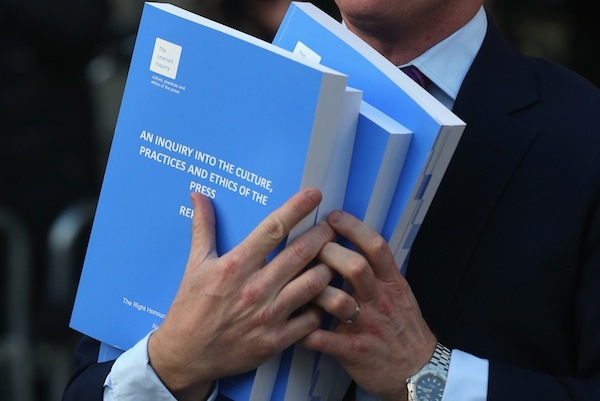For precisely 99 minutes yesterday, it looked like press freedom in Britain was doomed. At 1.30pm Lord Leveson announced his plans for statutory regulation of the press – with his bizarre instruction that we were not to call it statutory regulation. Worse, respectable commentators seemed to buy it. A very clever compromise, it was being argued. Self regulation really was being given another chance, albeit with a device which puts a legislative gun to the head of the press. If they obeyed his demands, he would not apply the force of the state.
But at 3.09pm, the Prime Minister rejected all this outright. The existence of such a device, he said, would mean politicians setting the parameters under which the press operates which it hasn’t done since 1695. No ifs, no buts, no fudge, no statutory regulation. The battle is not over: the press now needs to respond properly and (as James says) most MPs are pro-regulation (and, ergo, against Cameron). But for us advocates of press freedom, things are looking up. I look at this in my Daily Telegraph column today.
The Leveson episode has brought shame on the press collectively and my trade – already has sunk even lower in public esteem. The abuses documented in the 2,000 pages of Leveson were appalling. But most were criminal, and are being treated as such. The application of cold, rational argument strips away the case for state regulation of the press. Would it make hacking any less likely? Would it improve standards in the Bureau of Investigative Journalism? And if state regulation would do nothing to alleviate the problems, what would it threaten? Lord Leveson felt the need to act: there have been seven reports into the press in 70 years, he said. There should not be an eighth. But that’s not a reason to end 317 years of press freedom. The whole inquiry was, for me, a reminder of why we need a Bill of Rights: the whole doctrine of liberty is being forgotten and ignored. The Prime Minister has very little intellectual backup for what he did today.
I gather that Nick Clegg started off all pro-Leveson, but the more he read the report the graver his concerns grew. This was clear at a coalition committee meeting earlier today. In particular, the concern about Lord Leveson’s plans to punish publications like The Spectator who would not sign up to state licensing system on principle. We may end up having to pay the costs of people who sue us, even if we won. It’s a bizarre proposal, but even Clegg could see that it was likely to discourage investigative journalism. Clegg’s latent sense of liberalism began to twitch. About time too: he leads the Liberal Democrat party and you’d think the clue was in the name.
Throughout this long, often shocking and regularly tedious Leveson inquiry we have not heard much about principle. Cameron gave plenty yesterday. It was (to me) one of his moments of brilliance. He calmly and eloquently reminded MPs that the chamber had protected liberties for generations. His short speech was studded with Conservative thought. If it is not necessary to change then it is necessary not to change. His short, firm words advocated a principle of press freedom that was first outlined by John Milton and has been updated now and again by Jefferson and Churchill. It has taken a while, but we can now add Cameron to this list of liberty’s defenders.
At a time when journalists are as popular as the winter vomiting bug, he can’t expect much thanks. I daresay Andrew Cooper will have plenty caustic opinion polls to present to him in the next few days. Press freedom is a lonely and unpopular cause – but after yesterday, it looks like it has just acquired its most important defender.







Comments